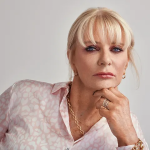The 401k Specialist and retirement industry expert advocates against financial abuse and guides women into being in charge of their finances. For Faith Teope, it’s personal. Financial abuse is just one of many forms of silent, “no-visible bruises” forms of abuse and an indicator that a victim is experiencing other forms of abuse. This is why Faith has chosen to deepen her understanding of retirement policy to discover ways to join the fight and safeguard victims against financial abuse. The statistics are now 1 in 3 women and 1 in 4 men.
“In the wake of this women’s movement and for the sake of my own daughters and son, I firmly stand for women being independently strong financially.”
Why do you have such a strong passion for helping those dealing with retirement, raising money-savvy kids, and women dealing with financial abuse?
Everyone has the right to live the life they want and be happy. Having a handle on your finances is an integral part of creating that life. If we could learn money skills at a young age, can’t you imagine where you would be today? What decisions you might have made differently? When I was in elementary school, my mother gave me my first taste of entrepreneurship. Because of that influence, I have made thousands of other savvy decisions. While my career is in giving working adults access to wealth-building tools so they can change the trajectory of their life, I can’t help but look to the next generations to see how they can have a stronger start.
My heart for advocacy against financial abuse runs deep. Statistics show the horrible economic impact this kind of abuse has on victims. Women are primarily the ones experiencing this kind of abuse and it often starts with the small decision to relinquish the daunting task of finance management (bills, accounts, taxes, investments) over to their romantic partner. In the wake of this women’s movement and for the sake of my own daughters and son, I firmly stand for women being independently strong financially.
You worked your way up with ‘Leverage Retirement Incorporated’, 20 years ago you were just an executive assistant and now you are the CEO. What were some battles you faced whilst building your career?
I discovered that funding was not the answer. There was a time when I had a big project idea, but I felt completely stonewalled because I did not have the corporate blessing to use monetary resources for it. One day during networking, as we wrapped up our conversation, a more tenured woman asked me how she could help. I was (and still am) always ready for this question. I told her in half a minute the problem I was facing and the solution I felt I needed, but asked how she would face it. Her answer to me was, “It is not ever about the money. It is about what the money can do.” Since then, not only has her quote rung in my ears, but I am now much better at remembering names and taking notes so I can circle back to thank people.
I also learned the pulls of procrastination. I have always been remarkable with my time, but I have procrastination skills level 1,000 just like the rest of us, which is a priority order issue. I learned this funny phrase from a fellow entrepreneur and author, Kinga Evans, “eat your frog first.” It is the idea that you do the daunting task first and everything else will taste like cake.
Next is Burnout. Burnout does not have to be a rite of passage, but I certainly experienced a couple of monumental burnouts that catapulted me into discovering my energy and rethinking my inner drive. Burnout, depression, and hopelessness are very detrimental. For those of us who have been there, we need to keep on the alert for the signs in ourselves and have ready ideas that create small restorations regularly, rather than wait for a vacation. Where I previously mentioned prioritising against procrastination, the second part of that is also being acutely aware of your energy. Sometimes my energy will allow me to perform better on a task that may have been priority #3, but I would get better results if I did it first. Energy should be a variable in determining your priority order. Protecting your energy is an active way of fighting against burnout.
 Bias navigation. I learned to always have a male counterpart with me because while I may do all the talking and have more experience I also understood that the male presence was like having a “verified” stamp on your words. I only count this as a battle, because it took an inter-working of myself to reframe so that I always got the job done and did not waste a single iota of energy pouting for validation. I will not ignore the bias, but I won’t kick and scream. I discovered that for me it was about working with what I have, then helping to shape the culture to pave the path for the ones coming in next.
Bias navigation. I learned to always have a male counterpart with me because while I may do all the talking and have more experience I also understood that the male presence was like having a “verified” stamp on your words. I only count this as a battle, because it took an inter-working of myself to reframe so that I always got the job done and did not waste a single iota of energy pouting for validation. I will not ignore the bias, but I won’t kick and scream. I discovered that for me it was about working with what I have, then helping to shape the culture to pave the path for the ones coming in next.
Speaking from experience, do you feel people are hesitant to take financial advice?
I believe it is not so much about hesitancy in taking financial advice, rather it is a pause because of the alignment of what they understand about their life with this new advice. I believe the bonus is on both the individual and the person giving the advice. Finance professionals need to be the greatest listeners, but it’s hard for finance nerds to pause their heads full of phenomenal details to listen to someone’s story, plight, struggles, and dreams. No, I don’t think people are hesitant to take financial advice, I think they are hesitant when they do not understand if that makes sense. I’ll add that one should never take advice that you do not understand.
How would you describe your childhood and upbringing and the impact it has had on your life?
I grew up flying between two countries my whole life. I am grateful for both my upbringing in a third-world country as well as a first-world country. Both lifestyles taught me so much about what to expect from the world and what to expect from myself. I learned very early that what works in one country, is not even acceptable in another. I believe it has given me greater empathy to accommodate other people’s world views and have a deeper respect for what they value. I believe empathy, compassion, and listening to learn are some of the greatest gifts we can give to one another.
As an official member of the Forbes Finance Council, can you tell us more about your role?
 As a Forbes Finance Council member, my role is to bring my experience to the table on topics that the council wants to address so that we can provide a more diverse resource to those seeking financial insights. My fellow members and I are from all over the vast field of finance. My field is retirement, so when I can team up with wealth management, investment advisors, CFOs, and financial planners, we bring more angles to a single topic. We collaborate on articles and occasionally meet in person to discuss ideas, business roadblocks, and idea generation for our businesses.
As a Forbes Finance Council member, my role is to bring my experience to the table on topics that the council wants to address so that we can provide a more diverse resource to those seeking financial insights. My fellow members and I are from all over the vast field of finance. My field is retirement, so when I can team up with wealth management, investment advisors, CFOs, and financial planners, we bring more angles to a single topic. We collaborate on articles and occasionally meet in person to discuss ideas, business roadblocks, and idea generation for our businesses.
What is some financial advice you’d give to our readers?
Own your money conversation. Run your money, before your expenses run you. It is way more simple than the world has made us believe. Take the time to expand your knowledge on money management, don’t be too hard on yourself. Remember that big money has to start with small money, so even if you only have a few pounds/dollars left over each pay check, be intentional with it. Have a few small goals and chip away at those big goals. Whether you are just getting started or you want to level up, there are loads of resources and I encourage you to seek them out. For a great start, check out the book, Rich Bitch by Nicole Lapin.







